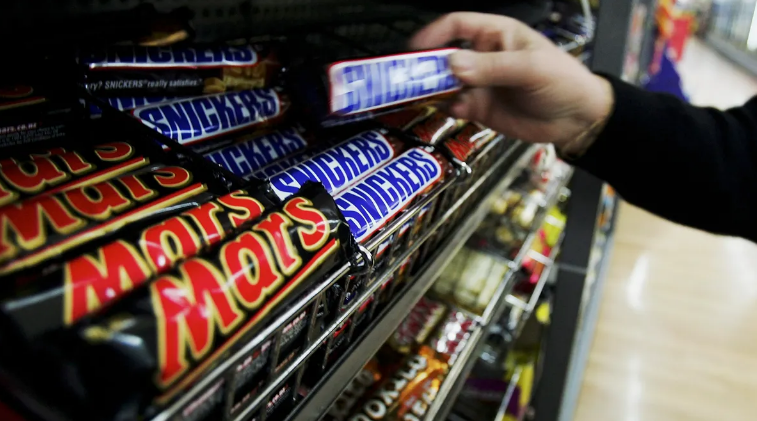According to its 2024 sustainability report released last week, the company achieved a 1.9% reduction in 2024 alone.
Mars attributes much of this progress to increased collaboration with the agricultural sector. Over the past year, the company has supported over 60 climate-resilient agriculture projects in 29 countries, helping to reduce emissions, improve soil and water quality, and enhance irrigation management techniques.
The company has also intensified efforts to combat deforestation, maintaining a cultivated land area equivalent to that of 2015, focusing on five key commodities: beef, cocoa, palm oil, pulp and paper, and soy.
 |
A customer selects a Snickers bar at a supermarket in Sydney, Australia. Photo: Getty Images |
A customer selects a Snickers bar at a supermarket in Sydney, Australia. Photo: Getty Images
As the owner of popular brands like Snickers, Twix, and M&M's, Mars reported significant growth during this period of emission reductions. Since 2015, the company's annual net sales have increased by 69%, reaching approximately 55 billion USD.
In 2024, 58% of Mars' production electricity came from renewable sources. The company aims to achieve 100% renewable electricity by 2040, halve its total value chain emissions by 2030, and reach carbon neutrality by 2050.
Furthermore, 64.1% of consumer-facing packaging is now reusable, recyclable, or compostable – up from 61% in 2023.
"We are committed not only to setting ambitious goals but also to demonstrating progress now," emphasized Alastair Child, Mars' Chief Sustainability Officer. According to Child, effective climate action requires coordination between businesses, governments, and farmers.
Since July thu nhat, Mars has integrated sustainability into its core business strategy and expanded the number of senior leaders whose compensation is linked to emission reduction targets from 400 to 2,000.
In addition to its environmental commitments, Mars recently established the 250 million USD Mars Sustainable Solutions Fund to support businesses providing solutions for emission reduction, ingredient innovation, sustainable agriculture, and circular packaging.
Earlier this year, Mars invested 27 million USD over five years to encourage emission reductions from dairy farmers – the 4th largest emitting sector in its supply chain, according to a February report. This is part of the Farmer Forward program, a collaboration with dairy cooperative Fonterra.
The Dan (Supply Chain Dive)












